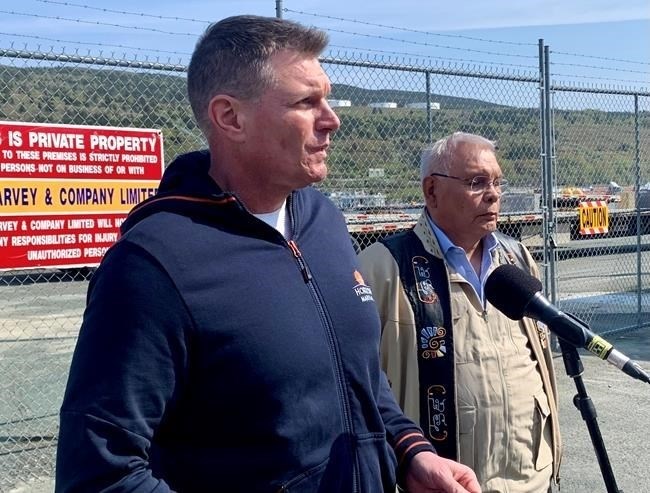
ean Leet, left, chairman of Horizon Maritime Services, stands with Chief Mi'sel Joe of the Miawpukek First Nation, at a news conference at the harbour in St. John's, Wednesday, June 21, 2023. Underwater noises described as “banging” have been heard in an area of the Atlantic where a submersible disappeared three days ago near the wreck of the Titanic, search officials confirmed Wednesday.
Image Credit: THE CANADIAN PRESS/Sarah Smellie
June 22, 2023 - 9:45 AM
The search for a submersible carrying five people took a grim turn Thursday as the U.S. Coast Guard confirmed that a “debris field” was discovered by a remotely operated vehicle near the wreck of the Titanic.
The brief coast guard statement said experts were evaluating the find, but no other details were released.
The submersible Titan, operated by U.S.-based OceanGate Expeditions, lost contact with surface vessels on Sunday morning as it was nearing the famous shipwreck during a 3,800-metre dive that usually takes about two hours.
Since then, a massive international search effort has been assembling about 700 kilometres southeast of Newfoundland. The search reached a critical stage Thursday as the small vessel's air supply was believed to be running low, but that looming deadline assumed the submersible was still intact.
American authorities have said "banging sounds" were detected in the search area on Tuesday and Wednesday, though the cause was unclear.
As the search entered its fifth day, two more remotely operated vehicles (ROVs) slipped into the water to search the dark ocean floor near the world's most famous shipwreck.
The United States Coast Guard, which is leading the search for the privately owned Titan submersible, confirmed that an ROV from the Canadian vessel Horizon Arctic had reached the site, which has its own, huge debris field to contend with. As well, another ROV from the French vessel L'Atalante was also in the area, the coast guard said.
The state-of-the-art Victor 6000 deep sea ROV, operated by France’s state-run ocean research institute, has robotic arms that could be used to secure lifting cables to Titan if the submersible is found, said Olivier Lefort, the institute's fleet director. He said Victor’s powerful lights and cameras can be used to find things within a 25-square-metre area.
Among those on board are Stockton Rush, CEO of OceanGate, based in Washington state.
As for Titan's air supply, OceanGate officials have told the U.S. Coast Guard that it can last up to 96 hours, which suggested a limited supply by Thursday morning.
Dr. Ken LeDez, a specialist in diving and hyperbaric medicine, said that number could be misleading. "It’s not like flicking a switch," the associate professor at Memorial University in St. John’s said Thursday.
If anyone on board is still alive, there's no way to know how much oxygen they've used over the past four days, LeDez said in an interview. If someone has died, there may be more oxygen available for the others. And if they have no heat source, they may be very cold or hypothermic, which would mean they’re using less oxygen, he said.
"There may still be a prospect for some to survive,” LeDez said. “It’s too soon to say it’s over."
The search is being conducted near a renowned fishing area known as the Grand Banks. Winds in the area Thursday morning were gusting up to 30 kilometres an hour, and swells were more than a metre high, the coast guard said.
Meanwhile, an expert with the Woods Hole Oceanographic Institution, in Falmouth, Mass., said the banging sounds detected earlier this week may have been caused by ocean creatures. Recordings of the noises are being analyzed by the U.S. Navy.
On another front, other experts have come forward to raise concerns about Titan, which was never "classed" or certified by an independent third party to ensure it met certain safety standards.
William Kohnen, president and CEO of the California-based engineering firm Hydrospace Group, has said about 95 per cent of all submersibles are certified. Titan, he said, "is very much an outlier."
Kohnen was part of a group of engineers and industry professionals who wrote to Rush in 2018 to express their concern. Their letter, first obtained by the New York Times, warned that the company’s “experimental” approach to Titan could have “catastrophic” consequences.
In a 2019 blog post, OceanGate explained that Titan was not classed because the process could inhibit innovation and did not address pilot error, which it said is the cause of most marine accidents.
This report by The Canadian Press was first published June 22, 2023.
— With files from Sarah Smellie in St. John's and Michael Tutton in Halifax.
News from © The Canadian Press, 2023